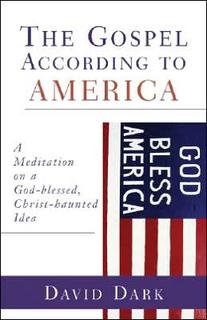Review: THE GOSPEL ACCORDING TO AMERICA
 "Religion and politics" - "Separation of church and state" - start any conversation around any of these attention-grabbers and you're in for a long evening. Blood pressure goes up, voice volume rises, and everyone's right except the other side of the fence. In The Gospel According to America (copyright 2005, Westminster John Knox Press), David Dark not only tackles politics and religion. He also brings a high bar to the discussion, setting the tone for civility and humility in the midst of conflicting mindsets.
"Religion and politics" - "Separation of church and state" - start any conversation around any of these attention-grabbers and you're in for a long evening. Blood pressure goes up, voice volume rises, and everyone's right except the other side of the fence. In The Gospel According to America (copyright 2005, Westminster John Knox Press), David Dark not only tackles politics and religion. He also brings a high bar to the discussion, setting the tone for civility and humility in the midst of conflicting mindsets.I'm reminded of one of the opening scenes in Gladiator, when Marcus Aurelius is trying to explain "Rome" to Maximus: "There was a dream that was Rome. You could only whisper it. Anything more than a whisper and it would vanish, it was so fragile." That's the feel of this book, because Dark is looking for a higher perspective of what America was intended to be, can still be if Christians will live Christ-like. There was a subversiveness to Christ's life and teaching - "love your enemies" and "blessed are the peacemakers" are radical statements in the midst of the oppression of Rome and of the Jewish leadership of the day. The dream of America has appeared to be in response to the oppression, established as a place of freedom, escaping tyranny and overcoming evil. The "gospel", the good news, is that the kingdom of God is at hand, and that we can live kingdom principles in a real way that will change lives and impact society. And somehow, that's a part of how America came to exist.
And that's the dream of America that gets lost when we think too highly of ourselves (Romans 12:3) and begin to think of ourselves as no longer "learners of truth", but as "owners of truth". That's Dark's thesis as I understand it: America loses itself when it thinks it has found itself, when it thinks there is no more room for improvement or for learning or for growing in righteousness. Seeing ourselves as the best of the best and needing to help others be as "best" as we are, we lose sight of the fact that we still have to strive for something better and beyond.
"... the better part of American valor might be a prudential, well-learned skepticism concerning our well-laid plans. American ambition is at its best when it goes to the trouble of daring to doubt itself. We have to be at least occasionally receptive to the notion that we ourselves might sometimes be the prospering wicked of whom the Hebrew prophets speak. If we're not, we only appropriate biblical phrases (usually taken out of context) to somehow christen our already made-up minds and surround ourselves (and our listeners) with a biblical-sounding aura" (pp. 9-10).Dark embarks on a journey through American Pop Culture to prove his point, taking our best authors and filmmakers and storytellers as the ones who really "get it" when thinking about and writing about who we are as a nation. Seemingly, instead of paying attention to ourselves in this phenomena, we are still involved in a "groupthink" that blinds us to the truth about who we are:
"A culture of groupthink will cultivate its own institutional belief structure (principality, power, team spirit) and our ability to think and see clearly will often fall victim to its persuasiveness. Neither Rod Serling nor the apostle Paul stands alone in their warnings of atmospheres in which honest questions provoke outrage and testimony that fails to fall in sync with the herd is viewed with angry suspicion... What becomes of the general welfare? Who watches the watchers?" (p. 153)I've thoroughly enjoyed questioning and pondering alongside David Dark in this book, and I've had conversations already that have been tinted by the thinking herein. As a matter of fact, I've got a friend who's going to borrow this book next. In the midst of all the conversation over politics and religion, we're better together when we open ourselves to the questions and the doubts and the answers that point to who we really are, who God really is among us.



0 Comments:
Post a Comment
<< Home